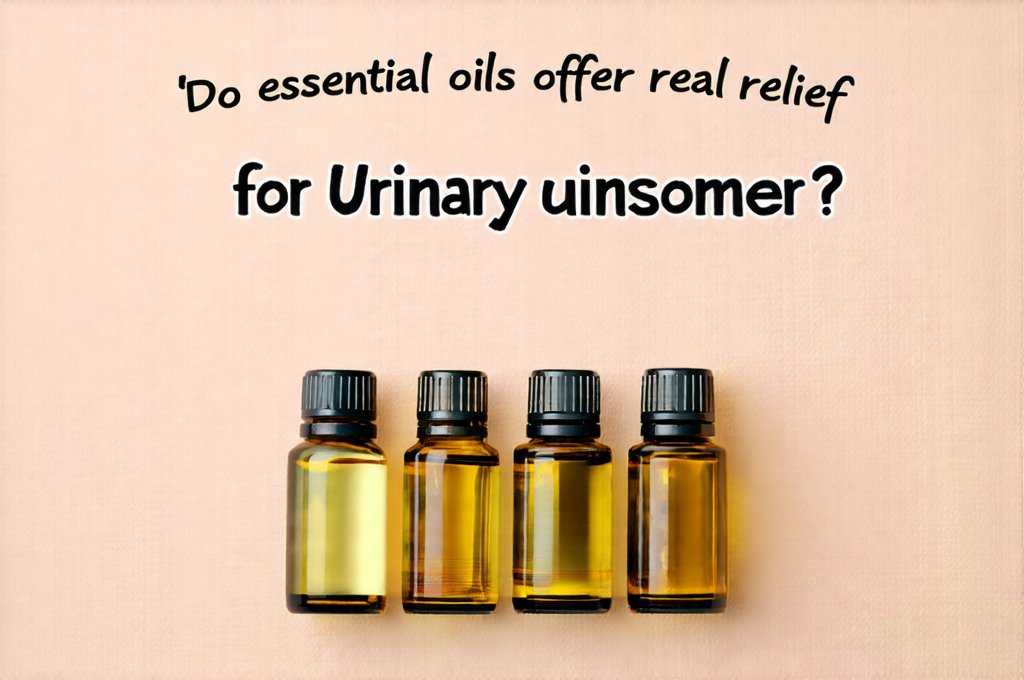Urinary discomfort is an incredibly common issue, affecting people of all ages and backgrounds. It can range from mild irritation to debilitating pain, significantly impacting quality of life. Often, the first instinct is to reach for conventional treatments, but a growing number of individuals are exploring complementary therapies – particularly essential oils – as potential avenues for relief. The appeal lies in their natural origins and perceived gentler approach, offering an alternative or adjunct to traditional medicine. However, navigating the world of essential oils can be overwhelming, with countless options and varying claims surrounding their efficacy. Understanding what science says (and doesn’t say) about these aromatic compounds is crucial before incorporating them into a wellness routine for urinary health.
The exploration of essential oils as remedies isn’t new; historically, various cultures have utilized plant-based therapies for numerous ailments. Today, the resurgence in interest stems from a desire for holistic healthcare and a perceived disconnect with conventional medicine’s often symptom-focused approach. While many anecdotal accounts highlight positive experiences with essential oil use for urinary discomfort, it’s vital to differentiate between personal testimonials and rigorously tested scientific evidence. This article aims to delve into the existing research – and limitations thereof – regarding the potential of essential oils to alleviate urinary discomfort, exploring both promising avenues and crucial considerations for safe usage. We will examine what conditions might benefit from such interventions, which oils show most promise, and how to use them responsibly.
Understanding Urinary Discomfort & Potential Essential Oil Applications
Urinary discomfort encompasses a broad spectrum of symptoms, including frequent urination, burning sensation during urination (dysuria), urgency, incomplete bladder emptying, lower abdominal pain, and cloudy or foul-smelling urine. These symptoms can be indicative of various underlying conditions, ranging from simple urinary tract infections (UTIs) – the most common cause – to more complex issues like interstitial cystitis (painful bladder syndrome), overactive bladder, kidney stones, or even sexually transmitted infections. It’s extremely important to determine the root cause of your discomfort through a proper medical diagnosis before attempting self-treatment with essential oils or any other alternative therapy. Essential oils should not be considered a replacement for professional medical care.
Essential oils aren’t likely to “cure” underlying urinary conditions, but they may offer symptomatic relief by addressing inflammation, pain, muscle spasms, or anxiety associated with these conditions. Specific oils possess properties that could potentially ease discomfort. For example, oils known for their anti-inflammatory effects might help reduce bladder irritation, while those with analgesic (pain-relieving) qualities could provide temporary respite from painful urination. Moreover, the calming aroma of certain essential oils can contribute to overall relaxation and stress reduction, which is particularly beneficial as anxiety can often exacerbate urinary symptoms. It’s important to remember that absorption and efficacy depend heavily on the method of application – topical use (diluted in a carrier oil), aromatherapy via inhalation, or even cautious internal use (under strict guidance from a qualified aromatherapist). To support overall hydration, consider managing fluid intake for daytime urinary relief.
The key lies in selecting oils with appropriate properties and using them safely and responsibly. Many essential oils are potent compounds that can cause adverse reactions if used incorrectly. Dilution is paramount for topical application, and certain oils should be avoided altogether during pregnancy or by individuals with specific health conditions. Furthermore, the quality of the oil matters significantly – opting for pure, therapeutic-grade essential oils from reputable sources is crucial to ensure efficacy and minimize the risk of contamination.
Essential Oils Showing Promise for Urinary Support
Several essential oils have garnered attention for their potential benefits in alleviating urinary discomfort. Tea tree oil (Melaleuca alternifolia), renowned for its potent antibacterial and antifungal properties, has been investigated for its ability to combat UTI-causing bacteria. However, it’s never recommended for internal use due to its toxicity; topical application, heavily diluted, may be considered with caution under the guidance of a healthcare professional. Similarly, chamomile (Roman or German) essential oil boasts anti-inflammatory and antispasmodic properties that could help soothe bladder irritation and reduce urinary spasms. Lavender essential oil, celebrated for its calming effects, can alleviate anxiety and promote relaxation, which indirectly benefits urinary health by reducing stress-related symptoms.
Other oils showing potential include juniper berry (Juniperus communis), traditionally used as a diuretic to support kidney function and flush out toxins; however, those with kidney problems should avoid it. Cypress essential oil may help strengthen bladder muscles and reduce incontinence, while clary sage (Salvia sclarea) has been suggested to balance hormones that can influence urinary frequency and urgency. It’s crucial to note that research on these oils specifically for urinary discomfort is often limited, and more robust studies are needed to confirm their efficacy. For those experiencing symptoms during warmer months, tips for urinary relief in hot weather can be beneficial.
It’s also vital to understand the importance of synergy when combining essential oils. Blending complementary oils – such as chamomile and lavender for a calming effect or tea tree and lemon for antibacterial support – can enhance their therapeutic benefits. However, always research potential interactions between oils before blending them, and prioritize safety by adhering to recommended dilution guidelines.
Considerations for Safe & Effective Use
The safe application of essential oils is paramount. Here are some crucial points to remember:
- Dilution: Always dilute essential oils in a carrier oil (such as jojoba, almond, or coconut oil) before applying them topically. A general guideline is 1-3% dilution for adults and even lower concentrations for children or individuals with sensitive skin.
- Patch Test: Before using an essential oil blend on a larger area of skin, perform a patch test by applying a small amount to your inner arm and observing for any adverse reactions (redness, itching, irritation) within 24 hours.
- Avoid Internal Use: Unless specifically advised and monitored by a qualified aromatherapist or healthcare provider, avoid ingesting essential oils, as many are toxic when taken internally.
- Pregnancy & Health Conditions: Certain essential oils should be avoided during pregnancy, breastfeeding, or if you have specific health conditions (e.g., epilepsy, asthma). Always consult with your doctor before using essential oils.
- Quality Matters: Choose pure, therapeutic-grade essential oils from reputable sources to ensure authenticity and minimize the risk of contamination.
- Storage: Store essential oils in dark glass bottles in a cool, dry place away from direct sunlight and heat.
Application Methods for Urinary Comfort
There are several ways to incorporate essential oils into your wellness routine for urinary support:
- Aromatherapy: Diffusing essential oils (lavender, chamomile) can create a calming atmosphere that reduces stress and anxiety associated with urinary discomfort.
- Topical Application: Diluted essential oil blends (tea tree, cypress) can be applied to the lower abdomen or back to soothe inflammation or muscle spasms. Avoid applying directly to sensitive areas.
- Compresses: Warm compresses infused with diluted essential oils can provide localized relief from pain and discomfort.
- Sitz Baths: Adding a few drops of diluted essential oil (chamomile, lavender) to a warm sitz bath can promote relaxation and soothe perineal irritation. If you find yourself struggling with nighttime bathroom trips, consider sleep position habits for nighttime urinary relief.
The Importance of Holistic Support & Medical Consultation
Essential oils should be viewed as complementary tools, not standalone cures. A holistic approach to urinary health encompasses lifestyle modifications, such as staying adequately hydrated, maintaining a balanced diet, practicing stress management techniques, and avoiding bladder irritants (caffeine, alcohol, spicy foods). Furthermore, it’s absolutely essential to consult with a healthcare professional to accurately diagnose the underlying cause of your urinary discomfort. Self-treating without proper diagnosis can delay appropriate medical intervention and potentially worsen your condition.
If you experience any concerning symptoms – such as fever, chills, back pain, blood in urine, or severe pain – seek immediate medical attention. Essential oils are not a substitute for professional medical care, but they may offer supportive relief when used responsibly and under the guidance of qualified healthcare professionals. Ultimately, informed self-care combined with expert medical advice is the most effective path to achieving lasting urinary health and well-being. If emotional factors contribute to your pelvic discomfort, exploring essential oils for emotional relief in pelvic tension might be helpful.





















